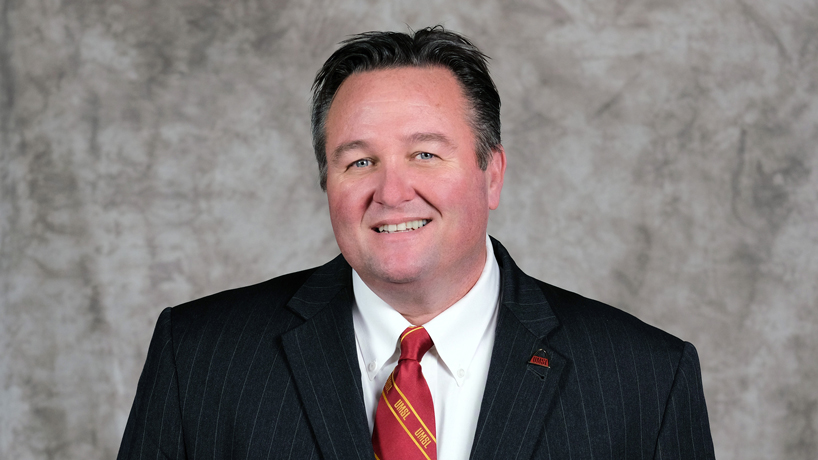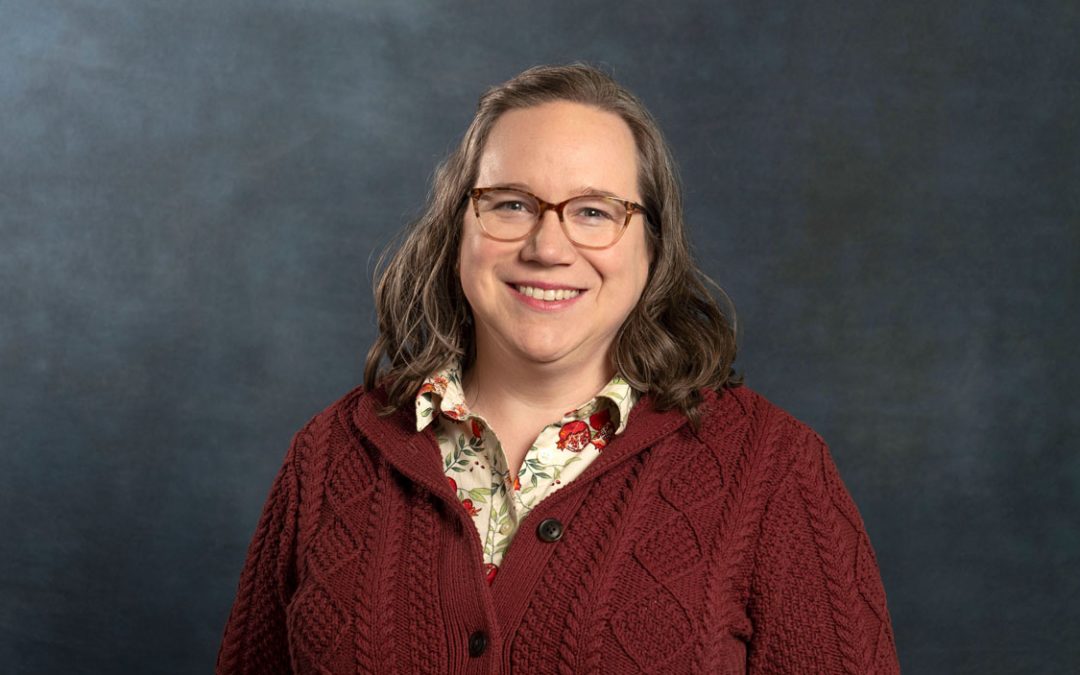
Paul Herring, who began as vice chancellor for University Advancement on Dec. 3, oversees university development and fundraising, alumni engagement, marketing and communications and St. Louis Public Radio | 90.7 KWMU. (Photo by August Jennewein)
Paul Herring likens the work he did at Texas Tech University to that of a mechanic.
In 2017, he began deconstructing the university’s decades-old fundraising structure and replacing it with a new one as vice president for university advancement. He analyzed, oversaw and advanced the unit, which went on to raise $180 million in fiscal year 2018, half of which is contingent funding for the university’s new School of Veterinary Medicine.
Herring’s now bringing that experience to the University of Missouri–St. Louis.
“When I was a kid, mechanics learned how to work on and build cars by dismantling them first,” UMSL’s vice chancellor for University Advancement said. “They take the engine apart and then figure out how to put it back together. I feel like that’s what I’ve done. I’ve had the opportunity to take the engine apart at Texas Tech, and so I know how the unit operates. That’s different than what I’ve been asked to do at UMSL, but I’m still tasked with building out the best structure that I can for us to be successful and sustainable moving forward.”
Since Dec. 3, Herring has overseen all aspects of the Division of University Advancement, which includes development and fundraising, alumni engagement, marketing and communications and St. Louis Public Radio | 90.7 KWMU. His duties include strategic planning and resource allocation for the four respective units, managing the Chancellor’s Council and serving as UMSL’s chief fundraising officer.
UMSL Daily spoke with Herring recently about his vision for the role and goals for his first year.
What interested you in this position?
The thing that interested me the most about this opportunity was the city of St. Louis and the opportunity to build toward a capital campaign. It’s a great city with a lot of history. The people are wonderful as well. When I had the first opportunity to interact with folks this past summer, I thought there was something pretty unique about the people and the culture.
I also want to make an impact and elevate the UMSL brand. You always want to improve upon whatever you’ve been given. My predecessor, Martin Leifeld, really took the university to a new level. He grew giving considerably during his time here. It’s going to be a challenge to best that, but that’s my intent. Having the opportunity to build something is exciting.
What are some of your goals for your first year as vice chancellor?
One of the initial things I want to do is gather an understanding of the culture, get to know our people internally and then the donors. There’s always a period of assessment when you come into a new position. You want to get an understanding of what the needs are. And, no question, there are great needs here. We’ve got some growing that we want to do.
I look at it as a 100-day approach of getting a good assessment of where we are, what the needs are for us to hit on all cylinders and to be competitive. There is a lot of competition in the marketplace, especially here in St. Louis. I want to make sure that we have a very strategic approach of aligning the university’s needs with the desires of the donors.
What are some of the university needs that you’ve already identified?
My background historically in advancement has been on the front line. Fundraising is where I’ve cut my teeth. I spent close to 15 years doing more of the frontline work. We need more boots on the ground building and nurturing relationships because that is where we are going to uncover the folks that have the capacity and willingness to give. I think that is probably the primary need for our unit. With UMSL educating a considerable amount of the St. Louis workforce, it will also be important for us to strengthen and further our relationships with regional corporations.
Another initial focus is making sure that all of the colleges and centers on campus have the right coverage from university development and marketing. There is value in all of the programs and colleges here, and we want to make sure that they are getting what they need from us.
What is your personal fundraising philosophy?
Donor centricity. That means while we try to align donors with our needs and strategies, they may want to give to another program. We have to be flexible. We as fundraisers have to listen more than we talk. Sometimes that’s hard for us. I’ve struggled with that, but I think being donor centric is paramount. If you approach things with that in mind, you are going to get so much farther down the road with them. I think that’s the right philosophy – plus it’s sustainable.
In addition to my fundraising philosophy, I don’t believe micromanagement is a leadership strategy that works. I believe in surrounding myself with competent people and then articulating a vision and removing impediments for people to accomplish their goals.
What is your vision for the units you oversee?
The common threads woven through everything that we do are impact and elevation. Donors always look for that when they make an investment. They want to know how the money they give is utilized and if it’s making an impact. All of our areas have to be communicating those things and on the same page.
Ultimately, our tagline here is, “We transform lives.” It’s three words, and it’s catchy. But it’s real and authentic. You can transform lives in multiple ways, and I would like to think that we can do that every day in all that we do. We should keep that tagline in the front of our minds and know that the goal is always to transform lives – no matter how big or small. Sometimes even the small things that we do have great impact.
What do you believe are UMSL’s greatest strengths?
I think it’s UMSL’s alignment with the city of St. Louis and that we educate the majority of the workforce for St. Louis. I like the “I chose UMSL” branding. I think our strength is in the community. The overwhelming majority of people that come to school here are from the region. There is a lot of pride in that. People are proud of coming through and getting their degrees from UMSL. We want to make it where they are even more proud so that we are able to draw more students from the area to come here. I think that’s one of UMSL’s strengths: the people.
What do you want the campus community to know about you?
I am a first-generation college graduate. I love sports. I’m very family oriented. That seems to resonate well in St. Louis. That’s a quality people certainly have here. I look forward to getting to know the city better and exposing my family to new things. That’s always a cool thing to do. Being back in a big city is going to be fun. It gives you a lot of opportunities to do things that you don’t necessarily get to do in smaller towns.














